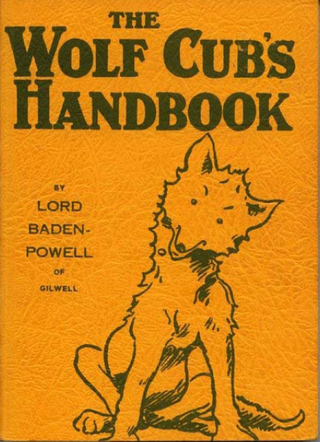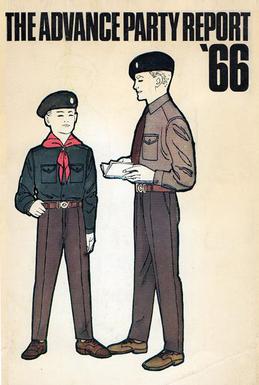Related Research Articles

Scouting, also known as the Scout Movement, is a worldwide youth movement employing the Scout method, a program of informal education with an emphasis on practical outdoor activities, including camping, woodcraft, aquatics, hiking, backpacking, and sports. Another widely recognized movement characteristic is the Scout uniform, by intent hiding all differences of social standing in a country and encouraging equality, with neckerchief and campaign hat or comparable headwear. Distinctive uniform insignia include the fleur-de-lis and the trefoil, as well as merit badges and other patches.

Lieutenant-General Robert Stephenson Smyth Baden-Powell, 1st Baron Baden-Powell, was a British Army officer, writer, founder and first Chief Scout of the world-wide Scout Movement, and founder, with his sister Agnes, of the world-wide Girl Guide/Girl Scout Movement. Baden-Powell authored the first editions of the seminal work Scouting for Boys, which was an inspiration for the Scout Movement.

The Baden-Powell Scouts' Association (B-PSA) is a worldwide youth organisation originating in the United Kingdom, with friendly relationships with similar traditional scouting organisations in various countries. Baden-Powell Scouting focuses on the importance of tradition in the scout movement.

Cub Scouts, Cubs or Wolf Cubs are programs associated with Scouting for young children usually between 7 and 12, depending on the organization to which they belong. A participant in the program is called a Cub. A group of Cubs is called a 'Pack'.

The Scout Association is the largest Scouting organisation in the United Kingdom and is the World Organization of the Scout Movement's recognised member for the United Kingdom. Following the origin of Scouting in 1907, the association was formed in 1910 and incorporated in 1912 by a royal charter under its previous name of The Boy Scouts Association.
Scouts South Africa is the World Organization of the Scout Movement (WOSM) recognised Scout association in South Africa. Scouting began in the United Kingdom in 1907 through the efforts of Robert Baden-Powell and rapidly spread to South Africa, with the first Scout troops appearing in 1908. South Africa has contributed many traditions and symbols to World Scouting.

Rover Scouts, Rovers, Rover Scouting or Rovering is a program associated with some Scouting organizations for adult men and women. A group of Rovers is called a 'Rover Crew'.
Scouting and Guiding in mainland China was reported as banned with the establishment of the People's Republic of China (PRC) by the Communist Party since 1949. Instead, the Young Pioneers of China and the Communist Youth League, led by the Communist Party, have become the dominant youth organization in mainland China for younger and older youth, respectively. However, China now has multiple and originally separate Scouting activities within its borders. In 2004, the Scout Club of Hainan (海南童子军俱乐部), borrowing heavily from Scouting in terms of emblems, uniforms and activities, was founded in Hainan Province; it is, however, not affiliated with worldwide Scouting. An attempt to organize a nationwide Scouting organization in Wuhan was ended by the government in 2004. The Scout Association of the People's Republic of China (中华人民共和国童军总会), founded in 2008 serves Venture Scouts in both genders as well as Rover Scouts. The Rover Explorer Service Association operate groups in China.

Scouts de Argentina is one of the national Scouting associations of Argentina. Scouting was officially founded in Argentina in 1912, shortly after the publication of "Scouting For Boys" in Spanish, which was granted a National Charter in 1917, and was among the charter members of the World Organization of the Scout Movement in 1922. Scouts de Argentina has 75,000 members as of 2020.
Traditional Scouting is "old-fashioned" or "back to basics" Scouting in some form, often with an emphasis on woodcraft and scoutcraft activities. As a pluralist movement, there is no one set definition for the term, but most traditionalists share a common set of values and procedures. Traditionalists aim to return the Scout Movement to something approximating its original style and activities; rejecting the trend of modernizing the program in an attempt to widen its appeal and/or use the name "Scouts" for new programs for ever-younger children.
John Frederick Colquhoun, CBE, nicknamed "Koko", was a long-serving headquarters official of The Boy Scouts Association of the United Kingdom and served on the World Organization of the Scout Movement's committee from 1959 to 1965.

The Wolf Cub's Handbook is an instructional handbook on Wolf Cubs training, published in various editions since December 1916. Early editions were written and illustrated by Robert Baden-Powell with later editions being extensively rewritten by others. The book has a theme based on Rudyard Kipling's The Jungle Book jungle setting and characters.

The Pathfinder & Rover Explorer Scouts' Association (P-RESA) is an independent Traditional Scouting Association in the United Kingdom, with International branches. The Association's training programme runs along the lines of Baden-Powell's original Scouting for Boys, upholding the traditions and practices set out by B-P, using the 1938 Boy Scouts' Association Policy Organisation & Rules (POR) as its basis.
Cub Scouts is the section of Scouts Australia for boys and girls aged 8 to 11 (inclusive), often known simply as 'Cubs'. The Cub Scout section follows after Joey Scouts and is before Scouts. Cub Scouts wear a uniform shirt with navy blue panels, and yellow shoulders.

A Scout group is a local organizational structure in some Scouting organizations that consists of different age programs, gender units and/or multiple units of the same age program.

Scouting for Boys: A handbook for instruction in good citizenship is a book on Boy Scout training, published in various editions since 1908. Early editions were written and illustrated by Robert Baden-Powell with later editions being extensively rewritten by others. The book was originally a manual for self-instruction in observation, tracking and woodcraft skills as well as self-discipline and self-improvement, about the British Empire and duty as citizens with an eclectic mix of anecdotes and unabashed personal observations and recollections. It is pervaded by a degree of moral proselytizing and references to the author's own exploits. It is based on his boyhood experiences, his experience with the Mafeking Cadet Corps during the Second Boer War at the siege of Mafeking, and on his experimental camp on Brownsea Island, England.

The Boy Scouts Association's The Chief Scout's Advance Party Report 1966 attempted to address the association's falling enrollment numbers and modernise its programs. It resulted in changes from traditional iconic uniforms, changes to awards, training schemes, the association's name and other nomenclature, reduced distinctions between Cubs and Scouts and discontinuation of Rovers. However, the changes failed to halt decline in older enrolments, resulting in a shift to younger ages and also resulted in disaffection, a schism in the organisation, growth of the alternate British Boy Scouts and European Scout Federation, formation of independent Scout groups and further alternate Scout organisations, particularly the Traditional Scouting Baden-Powell Scouts' Association and helped to re-establish understanding of Scouts as a movement rather than a single organisation.
Vera Charlesworth Barclay (1893–1989) co-founder of Cubs 1916, was an English pioneer of Scouting and an author. She was an early exponent of female leadership in the Scout movement and played a leading role in the introduction of the Wolf Cub programme for younger boys, both in the United Kingdom and in France. Barclay wrote numerous children's stories and instructional Scouting handbooks, and in later life wrote about her Christian faith.
Frederick Haydn Dimmock MBE was a British Scouting and science fiction magazine editor, writer of children's literature and supporter of the Boy Scouts Association.
C. Arthur Pearson Ltd was a British publisher of newspapers, periodicals, books, and comics that operated from 1890 to c. 1965. The company was founded by C. Arthur Pearson, later to be known as Sir Arthur Pearson, 1st Baronet.
References
- ↑ Jeal, Tim Baden-Powell: Founder of the Boy Scouts, Hutchinson, ISBN 978-0091706708 (pp. 398-399)
- 1 2 Moynihan, Paul, ed. (2006). An Official History of Scouting. London: Hamlyn. p. 174. ISBN 978-0-600-61398-5.
- ↑ Moynihan 2006, p. 178
- ↑ Gordon and Brooks p. 58
- ↑ Gordon, Alan and Brooks, Peter (editors), 75 Years of Scouting: A history of the Scout Movement in words and pictures, The Scout Association (1982), ISSN 0263-5410 (p. 57)
- ↑ JWR (April 2019). "The Rover World". cambridgedistrictscoutarchive.com. Cambridge District Scout Archive. Retrieved 30 October 2021.
- ↑ Cohen, Susan (2012), The Scouts, Shire Publications, ISBN 978-0-74781-151-0 (p. 13)
- ↑ Walker, Colin. "Scouting Milestones - Bibliography". scoutguidehistoricalsociety.com. Retrieved 23 January 2015.
- ↑ Walker, Colin. "Scouting Milestones - Biography: E". scoutguidehistoricalsociety.com. Retrieved 23 January 2015.
- ↑ Wade, E K (1935), The Story of Scouting - The Official History of the Boy Scout Movement since its Inception, C Arthur Pearson (p. 120)
- ↑ Moynihan 2006, p. 172
- ↑ Moynihan 2006, p. 177
- ↑ Moynihan 2006, pp. 176 & 181
- ↑ "The Passing Years - Milestones in the progress of Scouting" (PDF). scouts.org.uk. The Scout Association. August 2009. Retrieved 23 January 2015. (page 7 of 15)
- ↑ The Passing Years, page 14 of 15
- ↑ Scouting, December/January 2015 (p.3)
- ↑ Kidd, Tim (5 August 2020). "Protecting our movement for a brighter future". scouts.org.uk. The Scout Association. Retrieved 29 October 2021.
- ↑ "Scout and Scouting Magazine". scoutandscouting.com. Retrieved 29 October 2021.